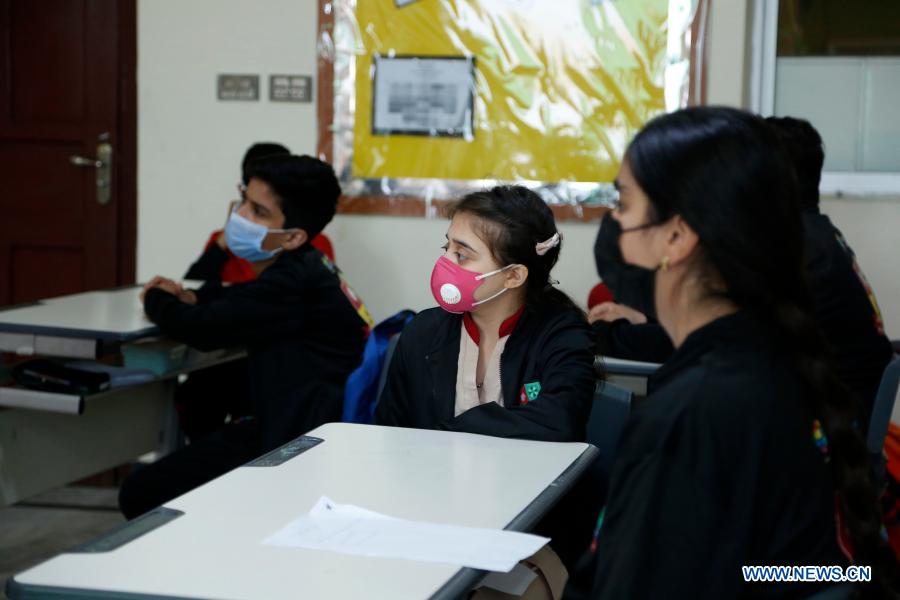Feature: Chinese language teachers in Pakistan help carry on friendship
- Misbah Saba Malik, Li Hao
 0 Comment(s)
0 Comment(s) Print
Print E-mail Xinhua, 03 22, 2021
E-mail Xinhua, 03 22, 2021

Students attend a Chinese language class at a campus of the Roots Millennium Schools in Islamabad, Pakistan, March 11, 2021. Currently, there are five Confucius Institutes and two Confucius Classrooms across Pakistan. According to the Pakistani think-tank Pakistan-China Institute, between 26,000 and 30,000 students are studying the Chinese language at various levels in Pakistan. (Xinhua/Ahmad Kamal)
By Misbah Saba Malik, Li Hao
ISLAMABAD, March 18 (Xinhua) -- Muhammad Mateen Hashmi, a lecturer at the Chinese language department of the Islamabad-based National University of Modern Languages (NUML), said he has seen local residents take an increasing interest in the Chinese language.
This is because of the strengthening of friendship between Pakistan and China, he said, adding that China-Pakistan Economic Corridor (CPEC) has prompted more people to learn the Chinese language for getting jobs or working better there.
"People-to-people friendship and knowing each other are deepening every year ... and in the near future I foresee more and more Pakistani people learning Chinese," he said.
Hashmi was a student in Shanghai Normal University in 2012 and got a degree in Chinese language teaching. "I had interest in the Chinese language since I was a kid, rather than the popular language English. Even in my childhood, I knew that I would be learning Chinese when I grew up," he said.
His study of Chinese started as early as 2008. In 2009, he attended a summer camp in Beijing.
"During the summer camp, I had the first hand interaction with native speakers and saw the beauty of the language, so I ended up making my mind to live with the Chinese language by learning and teaching it for the rest of my life," Hashmi said.
In the Confucius Institute in NUML, Zhang Daojian, 47, has been working for more than eight years.
The Confucius Institute, which was jointly established by Beijing Language and Culture University in 2005, is the first of its kind in Pakistan.
"Our main work is to conduct Chinese teaching activities and Chinese proficiency tests. We also collaborate with famous Pakistani universities and schools to teach Chinese. We have over 2,000 students per year on average," said Zhang, vice president of the Confucius Institute, Islamabad.
To help Pakistani students have a better understanding of the Chinese culture and history, Zhang said, his institute each year holds more than 20 cultural events and have organized summer camps to send students to China.
"Our cultural activities include performance, calligraphy exhibition and traditional practices related to various Chinese festivals. The focus is to let local students experience it by themselves, which can stimulate their interest in further exploring the Chinses culture," he said.
Last month, Zhang spent his ninth Spring Festival in Pakistan. "The hospitality and friendliness that the Pakistani people show to the Chinese people in Pakistan are priceless, and I'm deeply touched," he said.
This year marks the 70th anniversary of the establishment of diplomatic relations between China and Pakistan. Their bilateral friendship has been enriched over the years, with the people-to-people bond being cemented, Zhang said.
Zhang said he is happy his work of teaching Chinese helps enhance the people-to-people exchanges between the two countries.
Currently, there are five Confucius Institutes and two Confucius Classrooms across Pakistan. According to the Pakistani think-tank Pakistan-China Institute, between 26,000 and 30,000 students are studying the Chinese language at various levels in Pakistan.
The Millennium Education is cooperating with China's Henan Normal University in operating the Millennium Confucius Classroom in Pakistan.
Sabina Zakir, director for language, outreach and communication in the Millennium Education, said that currently there are over 8,500 students of Chinese language in different schools related to the education organization across the country.
The purpose of offering Chinese language courses is for enhancing the people-to-people contact between the two brotherly countries, she told Xinhua.
"These children are going to be tomorrow's leaders, and they will understand not only the language, it's understanding the culture," Zakir said.
Hashmi said, "The friendship is being passed on to the coming generations with more strength because in the future there will be more people with basic understanding of the Chinese language and more with a fluency in it." Enditem


